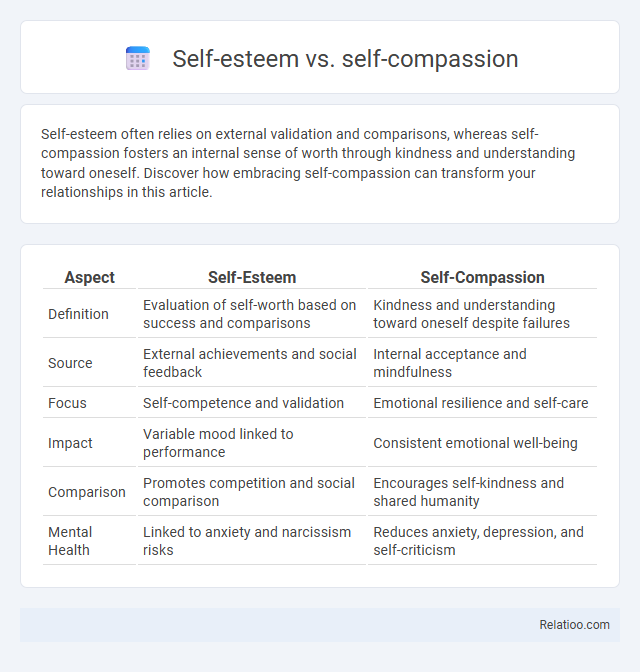Self-esteem often relies on external validation and comparisons, whereas self-compassion fosters an internal sense of worth through kindness and understanding toward oneself. Discover how embracing self-compassion can transform your relationships in this article.
Table of Comparison
| Aspect | Self-Esteem | Self-Compassion |
|---|---|---|
| Definition | Evaluation of self-worth based on success and comparisons | Kindness and understanding toward oneself despite failures |
| Source | External achievements and social feedback | Internal acceptance and mindfulness |
| Focus | Self-competence and validation | Emotional resilience and self-care |
| Impact | Variable mood linked to performance | Consistent emotional well-being |
| Comparison | Promotes competition and social comparison | Encourages self-kindness and shared humanity |
| Mental Health | Linked to anxiety and narcissism risks | Reduces anxiety, depression, and self-criticism |
Understanding Self-Esteem and Self-Compassion
Self-esteem reflects Your overall evaluation of self-worth, often influenced by external achievements or comparisons, whereas self-compassion involves treating Yourself with kindness during failures or hardships without judgment. Understanding the distinction helps nurture resilience; self-esteem can fluctuate based on success, but self-compassion provides a stable foundation for emotional well-being. Cultivating self-compassion supports personal growth by fostering acceptance and motivation beyond conditional self-worth tied to performance.
Key Differences Between Self-Esteem and Self-Compassion
Self-esteem depends on evaluating oneself positively based on achievements and social comparisons, often resulting in fluctuations tied to success or failure. Self-compassion involves treating oneself with kindness and understanding during struggles, promoting emotional resilience without relying on external validation. Unlike self-esteem, self-compassion fosters stable well-being by embracing imperfections, which supports sustainable personal growth through acceptance and continuous self-improvement.
The Foundations: Origins of Self-Esteem vs Self-Compassion
Self-esteem often originates from external validation and achievements, shaping Your sense of worth based on success and recognition. Self-compassion, in contrast, stems from an internal acceptance and kindness toward oneself, nurtured by mindfulness and understanding of personal suffering. Recognizing these distinct foundations enhances personal growth by balancing self-worth with emotional resilience and empathy.
How Self-Esteem Shapes Our Self-Image
Self-esteem shapes your self-image by influencing how you evaluate your worth and abilities, often based on external achievements and social comparisons. Unlike self-compassion, which encourages kindness towards yourself regardless of success or failure, self-esteem relies heavily on positive feedback and validation, making it vulnerable to fluctuations. Fostering balanced self-esteem is crucial for sustainable personal growth, as it provides motivation while self-compassion safeguards emotional resilience during setbacks.
The Power of Self-Compassion in Challenging Times
The power of self-compassion in challenging times lies in its ability to provide emotional resilience and reduce self-criticism, fostering a healthier mental state than self-esteem alone. While self-esteem depends on external validation, self-compassion encourages kindness toward yourself during setbacks, promoting sustainable personal growth. Embracing self-compassion allows you to navigate difficulties with greater ease, ultimately strengthening your capacity for continuous self-improvement.
Psychological Benefits of Self-Esteem and Self-Compassion
Self-esteem enhances your confidence and resilience by fostering a positive self-view, which supports mental well-being and motivation. Self-compassion promotes emotional regulation and reduces anxiety by encouraging kindness towards yourself during failures or setbacks. Both self-esteem and self-compassion contribute to personal growth by strengthening psychological health and enabling adaptive coping strategies.
Common Myths and Misconceptions
Self-esteem is often mistaken for arrogance or entitlement, but it simply reflects your overall sense of self-worth, while self-compassion is frequently misunderstood as self-pity or weakness, when it actually involves treating yourself with kindness during challenges. Personal growth is commonly confused with perfectionism or constant productivity, yet it means embracing mistakes as learning opportunities and fostering continuous improvement. Clearing these misconceptions helps you build a healthier mindset rooted in realistic self-appreciation and resilience.
Building Self-Compassion: Practical Strategies
Building self-compassion involves recognizing one's own suffering without judgment and responding with kindness and understanding, which fosters emotional resilience and reduces self-criticism. Practical strategies include mindfulness meditation to cultivate present-moment awareness, journaling exercises to reframe negative self-talk, and practicing self-kindness through affirmations and compassionate self-dialogue. These approaches promote personal growth by creating a supportive internal environment that enhances self-esteem and encourages continuous self-improvement.
Balancing Self-Esteem and Self-Compassion for Well-being
Balancing self-esteem and self-compassion enhances psychological well-being by fostering a realistic self-view while promoting kindness toward personal flaws, reducing anxiety and depression risks. Self-esteem involves evaluating self-worth, often based on achievements or approval, whereas self-compassion emphasizes acceptance and understanding during failures, supporting emotional resilience. Integrating these elements encourages sustainable personal growth by motivating improvement without harsh self-criticism, leading to healthier mental health and overall life satisfaction.
Choosing Self-Compassion Over Self-Esteem: Why It Matters
Choosing self-compassion over self-esteem promotes emotional resilience by encouraging kindness toward oneself during failures rather than relying on external validation. Self-compassion fosters personal growth through acceptance and understanding, reducing the pressure to meet unrealistic standards that often accompany self-esteem. Prioritizing self-compassion enhances mental well-being, creating a sustainable foundation for long-term development and authentic self-improvement.

Infographic: Self-esteem vs Self-compassion
 relatioo.com
relatioo.com